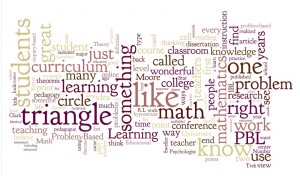 When most educators think of Problem-Based Learning, they are talking about an instructional method that has historically been used at the graduate and professional schooling level (mostly in Medical Schools). PBL is an “instructional (and curricular) learner-centered approach that empowers learners to conduct research, integrate theory and practice, and apply knowledge and skills to develop a viable solution to a defined problem. Critical to the success of the approach is the selection of ill-structured problems (often interdisciplinary) and a tutor who guides the learning process and conducts a thorough debriefing at the conclusion of the learning experience. Goals of PBL include to work cooperatively, to demonstrate effective communication skills, and to use content knowledge and intellectual skills to become continual learners” (Savery, 2006, p.16). This general definition of PBL has been used in many instances and at many levels. As it says, instructors can interpret this definition in a pedagogical way – in how they run their classroom, or in a curricular way – in the way they utilize problems in their classroom. There is a very wide continuum of interpretation of PBL and in my view, a very wide continuum of what types of PBL are effective, at different levels of education.
When most educators think of Problem-Based Learning, they are talking about an instructional method that has historically been used at the graduate and professional schooling level (mostly in Medical Schools). PBL is an “instructional (and curricular) learner-centered approach that empowers learners to conduct research, integrate theory and practice, and apply knowledge and skills to develop a viable solution to a defined problem. Critical to the success of the approach is the selection of ill-structured problems (often interdisciplinary) and a tutor who guides the learning process and conducts a thorough debriefing at the conclusion of the learning experience. Goals of PBL include to work cooperatively, to demonstrate effective communication skills, and to use content knowledge and intellectual skills to become continual learners” (Savery, 2006, p.16). This general definition of PBL has been used in many instances and at many levels. As it says, instructors can interpret this definition in a pedagogical way – in how they run their classroom, or in a curricular way – in the way they utilize problems in their classroom. There is a very wide continuum of interpretation of PBL and in my view, a very wide continuum of what types of PBL are effective, at different levels of education.
My definition of problem-based learning comes from my long history of experience with PBL as a deep connection with curriculum and pedagogy:
“An approach to curriculum and pedagogy where student learning and content material are (co)-constructed by students and teachers through mostly contextually-based problems in a discussion-based classroom where student voice, experience, and prior knowledge are valued in a non-hierarchical environment..” (Schettino, 2013)
I feel strongly that at the secondary level, PBL, must be a combination of a carefully written and planned curriculum situated in a strong sense of pedagogy that fosters a classroom community that allows risk-taking, values discourse, student-centeredness and other constructivist ideals. Without this important combination, and all that it implies, it is difficult for this type of instructional approach to be totally effective. Anyone interested in PBL at the secondary level, should also look into technology use, metacognitive journaling, discourse in the classroom, and also feminist relational mathematics pedagogy. My future research projects include looking into how PBL effects attitudes of girls’ and other underrepresented groups towards learning mathematics, professional development of teachers in instruction with PBL, comparison of PBL classrooms to traditional classrooms in coed and single-sex environments and many others.
In April 2013, I successfully defended my dissertation study that looked at adolescent girls’ experiences in a PBL environment in a high school mathematics classroom – specifically their attitudes of self-confidence, value, enjoyment, empowerment and agency towards the subject of mathematics and the mathematics classroom. Soon you should be able to go to UM/IDissertation Express and order a copy to read my results. You may also contact me for information about that. I will be presenting at PME-NA in Chicago in the fall and am currently working on a article on my findings.
My main interest is in PBL in mathematics in secondary education, but I love talking to people about how they are using it in middle school and college classes as well. I have done much reading and worked with a few teachers who are writing at the middle school level and am on an advisory board for a college level inquiry-based NSF-funded project.
There are many resources out there nationally and internationally for problem-based and project-based learning for schools and individuals. I am a member of the AERA’s special interest group for PBL and they have a great website that has tons of resources. You can find many links on PBL at my delicious account at http://www.delicious.com/SchettinoPBL and click on the tag for PBL pages